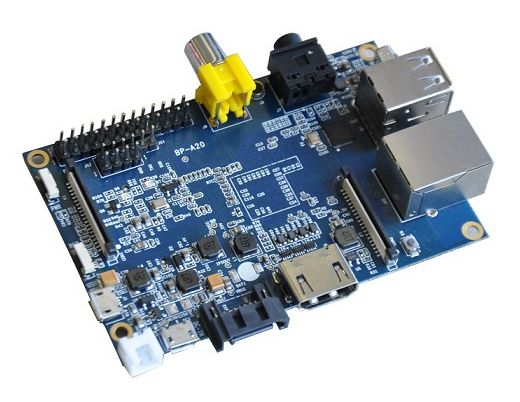HowTo Build Banana Pi Image using GitHub Source in 9 easy steps

Banana Pi is Chinese made single-board computer having capability to run Android, Ubuntu and Debian Operating Systems. IT is developed with the intention of promoting the STEAM (science, technology, engineering, art and mathematics) education in schools.
You can find it’s source on famous Open Source code hosting service GitHub as BananaPi-Dev.
Everyone can easily create better projects from this small step. We also hope to see lots of applications, educational courses and/or products running on Banana Pi.
Here is HowTo page from Github
=====How To Build Banana Pi Image=====
This document is for the developers who want to build their own BPi images to get related source and certain steps to do.
Then the Banana Pi developers can start from those source and modify with their wonderful ideas for fantastic applications on Banana Pi.
=====Procedures=====
0. Using Ubuntu Linux (12.04 or later) as the development platform, install the following packages:
$ sudo apt-get install build-essential libncurses5-dev u-boot-tools qemu-user-static debootstrap git binfmt-support libusb-1.0-0-dev pkg-config $ sudo apt-get install gcc-arm-linux-gnueabihf
1. Setup the working space. $ export WORKSPACE=`pwd` 2. Get the GitHub source code from sunxi-bsp source. $ git clone https://github.com/bananapi-dev/sunxi-bsp 3. Change the directory to sunxi-bsp. $ cd sunxi-bsp 4. Set the environment. $ source bpi_env.sh 5. Update and compile the source code of Banana Pi. Need to configure cubietruck as a starting example because we can not find Bananapi project at the first time. $ make $ make update $ make clean Start to configure Bananapi and then compile! $ ./configure Bananapi $ make update $ make 6. Download the rootfs package you preferred (such as Ubuntu/Lubuntu/Respbian...etc.), extract to $WORKSPACE List Ubuntu as an example here. $ cd $WORKSPACE $ wget https://releases.linaro.org/12.11/ubuntu/precise-images/ubuntu-desktop/linaro-precise-ubuntu-desktop-20121124-560.tar.gz $ mkdir ROOTFS_DIR $ sudo tar --strip-components=3 -pzxvf linaro-precise-ubuntu-desktop-20121124-560.tar.gz -C ROOTFS_DIR 7. Copy related files to the directory ROOTFS_DIR $ sudo cp sunxi-bsp/build/Bananapi_hwpack/kernel/script.bin ROOTFS_DIR/boot $ sudo cp sunxi-bsp/build/Bananapi_hwpack/kernel/uImage ROOTFS_DIR/boot $ sudo gedit ROOTFS_DIR/boot/uEnv.txt Add text as below mmcboot=fatload mmc 0 0x43000000 script.bin || fatload mmc 0 0x43000000 evb.bin; \ fatload mmc 0 0x48000000 uImage; if fatload mmc 0 0x43100000 uInitrd; \ then bootm 0x48000000 0x43100000; else bootm 0x48000000; fi uenvcmd=run mmcboot bootargs=console=ttyS0,115200 console=tty0 \ disp.screen0_output_mode=EDID:1280x720p60 \ hdmi.audio=EDID:0 root=/dev/mmcblk0p1 $ sudo cp -r sunxi-bsp/build/Bananapi_hwpack/rootfs/* ROOTFS_DIR $ sudo gedit ROOTFS_DIR/etc/network/interfaces Add text as below auto eth0 iface eth0 inet dhcp $ sudo vi ROOTFS_DIR/etc/NetworkManager/NetworkManager.conf Modify it as below [ifupdown] managed=true 8. Format the sdcard (assume the sdcard mounted at /dev/sdb) // Recommend to use 8G/Class 10 sdcard for better BPi experience $ sudo umount /dev/sdb1 $ sudo dd if=/dev/zero of=/dev/sdb bs=1k count=1024 $ sudo dd if=sunxi-bsp/build/Bananapi_hwpack/bootloader/u-boot-sunxi-with-spl.bin of=/dev/sdb bs=1024 seek=8 $ sudo fdisk /dev/sdb Create a partition $ sudo mkfs.ext4 /dev/sdb1 9. Copy ROOTFS_DIR into sdcard $ mkdir mnt $ sudo mount /dev/sdb1 mnt $ sudo cp -a ROOTFS_DIR/* mnt $ sudo sync =====End=====
Comments are closed.